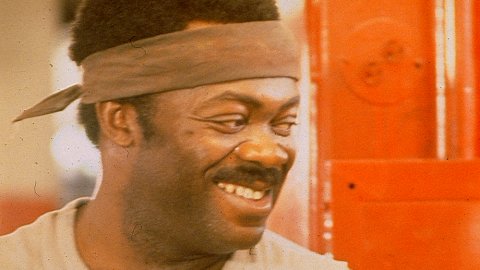
Adam Murray
on Mon 19 July 2021Yaphet Kotto: A Tribute By Adam Murray
Posted on Mon 19 July 2021
Film programmer and writer Adam Murray pays homage to actor Yaphet Kotto who passed away earlier this year, leaving behind an incredible body of work.
Yaphet Kotto passed away on 15th March of 2021 at the age of 81, leaving behind him an incredible acting legacy and impressive body of work that spanned six decades of stage and screen. Whether it’s Dr Kananga aka Mister Big in Live and Let Die (1973), Parker in Ridley Scott’s Alien (1979) or as Jocko, his first major role in Michael Roemer’s Nothing But A Man (1964), which was also considered to be Malcolm X’s favourite film (screened by Come The Revolution, May 2015, Watershed), Kotto would bring a certain kind of gravitas and complexity to every role, busting pre-existing stereotypes wide-open on the big screen.
His passing took place on my birthday, in the middle of an already gruelling pandemic lockdown in the UK. I thought about how many incredibly talented people had passed away over the previous year, how many ‘Black-Stars’ who shined their light and unique gifts to educate, entertain and inform us over the years and decades, that had come to a premature end in seemingly never ending succession; TY, Chi Modu, Clarence Williams III, Paul Mooney, Shock G, DMX, Stezo, Don Campbell, Bill Withers, Bunny Wailer, Cicely Tyson, MF Doom, Adolfo Quinones, Carol Sutton, Tommy Lister, Toots Hibbert, Johnny Nash, Chadwick Boseman, Betty Wright, Little Richard, Andre Harrell, Tony Allen, Manu Dibango, McCoy Tyner, Esther Scott… Too many to mention. Too many to comprehend. Just some of the names that painfully spring to mind during a period of time where it feels like we’ve not been able to honour, lament and celebrate their gifts and the joy that they have brought to so many over illustrious careers, decades and lifetimes. I’ve also being struck by a profound realisation that we’ve not been able to celebrate these trailblazers collectively in ways that we would have culturally and societally been able to do in previous times. This piece also honours everyone that has lost a hero or loved one over the last year and half.
For a younger generation, Yaphet Kotto’s name might only be recognisable as the title of a Childish Gambino song, and his name could also be easily confused with the political Hardcore band (named in tribute to the actor) from the late 1990’s/early 2000’s.
For me, I will always remember him as Parker in Alien, Lt. Pope in Across 110th Street alongside Anthony Quinn and Smokey in Blue Collar. However, there is so much to explore and celebrate with regards to Yaphet Kotto who has always struck me as a man of integrity, a performer that took risks, was fully invested in every role he played and who brought, nuance, stoicism, sophistication, sincerity and focus to every character that he played. His performances always seemed to embody a sense of lived experience and a matter-of-fact-ness associated with authenticity. For a physically thick set and tall, dark-skinned Black man, he had the range and versatility to challenge Hollywood’s pre-conceived notions of black masculinity, and consistently challenged typecasting by playing against type, even when typecast. Great examples of this are of course Dr Kananga aka Mister Big undoubtedly one of the most unforgettable Bond Villains and Parker of Ridley Scott’s Alien; pitch perfect casting alongside Harry Dean Stanton’s Brett. Two roughneck, working class ‘space-truckers’, just trying to earn a buck.
“You ask yourself, how can you survive in acting against a monster? Will you be remembered?”
(Yaphet Kotto, on his character Parker in Alien).
Kotto was born in New York on 15th November 1939, His Father from Cameroon and his Mother of Panamanian and West Indian heritage. His fascination with acting started young. At the age of 16, he attended The Actors Mobile Theatre Studio and by the age of 19 landed his first professional acting role in a production of Othello; he would later reprise the role in a 1980’s entirely Black and independent production of Othello, both cast and crew, shot on 16mm and directed by Liz White. Kotto had a prestigious stage career. In 1969, he took over the lead role of James Earl Jones in the opening Broadway run of the Great White Hope. In later years, their careers would mirror each other once again on stage. Both great actors celebrated for their performances in the role of Troy Maxson in August Wilson’s play Fences.
Kotto’s career on the big screen is full of notable highlights and cult curios. Bone (1972) directed by Larry Cohen springs to mind, as well as early performances in Brubaker (Rosenberg, USA, 1980) and The Thomas Crown Affair (Jewison, USA, 1968.) He could both lead and provide incredible support. Alongside Robert De Niro in Midnight Run (Brest, USA, 1988) to Schwarzenegger in The Running Man (Glaser, USA, 1987) to Isaac Hayes in Truck Turner (Kaplan, USA, 1974,) every performance is nuanced and memorable. The more you explore his filmography, the more you become astounded by his range and the sheer scope of his body of work. There are still some titles I’ve not seen and am eager to explore after researching this piece; A House Divided: Denmark Vesey’s Rebellion (Lathan, USA, 1982) and Report To The Commissioner (Katselas, USA, 1975), which was also Richard Gere’s debut. And anyone that knows me knows this sounds absolutely crazy, but I’ve yet to see William Wyler’s The Liberation of L. B. Jones (which also starred Lee Majors and a young Barbara Hershey.)
Kotto’s career also excelled on the small screen his Emmy nominated portrayal of Idi Amin in Irvine Kershner’s 1976 TV-film Raid On Entebbe, as well as a long list of guest appearances on shows as varied as Hawaii Five-O and Murder She Wrote. However, on the small screen he will be best remembered as Lt Al Giarderro on police procedural show Homicide: Life On The Streets, Based on David Simon (of The Wire-fame’s) book, Homicide: A Year On The Killing Streets (1990.)
“You learn on stage don’t pull the same trick twice”
Yaphet Kotto
Some interesting revelations in regards to Yaphet Kotto’s career choices are that he was offered the roles of both Jean Luc Picard in Star Trek: The Next Generation (USA, 1987-1994) and also Lando Calrissian in Star Wars Episode V: The Empire Strikes Back (Kershner, USA, 1980) who of course are now famously known to be played by Sir Patrick Stewart and Billy Dee Williams.
Another endearing quality for me is that it feels as if Kotto wasn’t afraid to take risks or try unorthodox creative things; contributing to a voiceover as Parker alongside Sigourney Weaver and Tom Skerritt for video game Alien: Isolation (2014), or starring in Horror films, as Doc in Freddy’s Dead: The Final Nightmare (Talalay, USA, 1991). And as a teenager, I can vividly remember watching Michael Moore’s TV Nation (1994/95) and a segment hosted by Rusty Cundieff (Tales From The Hood, USA, 1995) in which Yaphet Kotto demonstrated in a painfully real satirical TV experiment how New York City cab drivers never stop for Black men, (which also included an appearance by Hip Hop pioneers Run DMC.)
“They pit the lifers against the new boy and the young against the old. The black against the white. Everything they do is to keep us in our place.”
Yaphet Kotto as Smokey (Blue Collar, Schrader, 1978.)
A final insight into the man that Yaphet was, beyond that of a gifted actor, is provided in the story he related to his daughter and shared at the TIFF Opening Doors Q&A with Ridley Scott (2003.) Yaphet was relating to her how years before in 1963, he had stood in the same place listening to Dr King’s speech in DC contemplating if things would ever truly change, and if he would ever be able to see ‘that Dream’ realised? And how perhaps he could bring his own dream to life and achieve his goal as a successful African American actor. A bus carrying Japanese children pulled up in front of him and his daughter. The children ran up to him talking in Japanese. Only one word in English was discernible, “Alien, Alien”. In that moment Yaphet was struck, and probably moved by the realisation that his life’s work had made its mark.
“At that moment, it was so spooky to me, I’d realised ‘The Dream’ had come true. I was now known all throughout the world”
Yaphet Kotto TIFF Opening Doors (2003)
Watch the Opening Doors animated short from Toronto International Film Festival, presenting an excerpt from a Q&A by Yaphett Koto, recorded at TIFF. Yaphett Koto talks about his start and how the movie Alien was both gender and race breaking when it came out. With sound/music by Jeff Moberg. https://polyesterstudio.com/tiff-alien/
Follow Adam Murray on Twitter @Admagnetic and Bristol Black Horror Club @BrisBlakHorrorC


